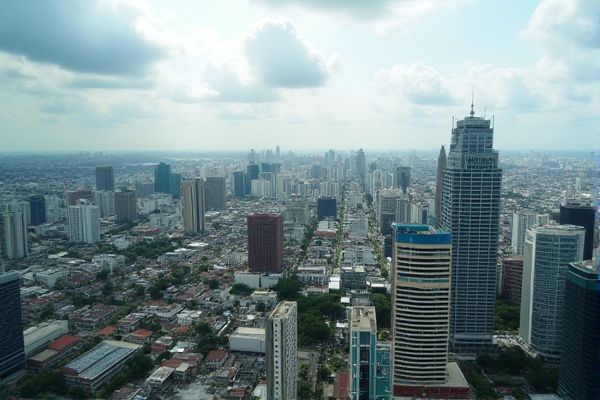
Utilities setup and providers in Thailand: Major electricity provider: Electricity Generating Authority of Thailand (EGAT). Common water supplier: Metropolitan Waterworks Authority (MWA). Contact local Provincial Electricity Authority (PEA) for connections. Internet options: AIS, TRUE, 3BB. Mobile network providers: AIS, DTAC, TRUE. Residential gas often in LPG cylinders. Initial deposit usually required for utilities. Online bill payment widely available. Possible delays during rainy season. Customer service often limited to Thai language.
Major electricity provider: Electricity Generating Authority of Thailand (EGAT).
The Electricity Generating Authority of Thailand (EGAT) stands as the largest power producer in Thailand, having been established on May 1, 1969. EGAT is tasked with the crucial roles of electric power generation, transmission, and bulk electric energy sales. Its operations encompass 53 power plants, boasting a substantial total installed capacity of 16,237.02 MW. This mammoth energy framework supplies electricity to the Metropolitan Electricity Authority (MEA) and the Provincial Electricity Authority (PEA) for extensive distribution across the nation. For more comprehensive information about its operations and history, you can visit the official Electricity Generating Authority of Thailand page on Wikipedia.
Common water supplier: Metropolitan Waterworks Authority (MWA).
The Metropolitan Waterworks Authority (MWA) is a Thai state enterprise under the Ministry of Interior, tasked with the crucial role of producing, distributing, and selling treated water in the urban areas of Bangkok, Nonthaburi, and Samut Prakan. This organization sources its raw water from significant bodies such as the Chao Phraya River and the Mae Klong Dam. The water is then processed at four specialized treatment plants before being distributed through an extensive network of 37,700 kilometers of water pipes, reaching over 2.3 million customers. For further details, you can visit the Metropolitan Waterworks Authority page on Wikipedia.
Contact local Provincial Electricity Authority (PEA) for connections.
To set up or manage your electricity connection in Thailand outside of the Bangkok metropolitan area, you need to contact the Provincial Electricity Authority (PEA). You can visit your nearest PEA office with a form of ID, rental contract, or mortgage documents to initiate or disconnect your electricity service, and you can also use their contact center at 1129 for inquiries or issues.
Internet options: AIS, TRUE, 3BB.
In Thailand, AIS-3BB Fibre3, True Online, and 3BB are the leading internet providers. AIS-3BB Fibre3 offers consistent high-speed fibre-optic connections with wide coverage, especially in urban areas like Bangkok, Chiang Mai, and Phuket. True Online provides extensive coverage and competitive packages with various add-ons, while 3BB is known for its value packages, though with more limited coverage. All providers often require one-year contracts and may charge installation fees, but offer speeds up to 1 Gbps and various additional services like TV packages and public WiFi. For more detailed insights into the top choices, refer to the review of the Top Internet Providers In Thailand.
Mobile network providers: AIS, DTAC, TRUE.
In Thailand, the major mobile network providers are AIS, DTAC, and TrueMove H. AIS leads in overall Games Experience and 5G Games Experience, while DTAC has taken the lead in Video Experience and shares the top spot with AIS for 5G Video Experience. The recent merger between DTAC and TrueMove H, forming True Corp, aims to challenge AIS's dominance and enhance mobile network experiences across the country. For more detailed insights, you can visit the Mobile Network Experience report by OpenSignal, where comprehensive analyses illuminate the evolving landscape of Thailand's mobile network performance.
Residential gas often in LPG cylinders.
In Thailand, residential gas is typically provided through Liquefied Petroleum Gas (LPG) canisters, as there is no mains gas supply. Residents purchase these canisters from local shops, paying a deposit and the cost of the gas, with the option to have them delivered and exchanged when empty. For more detailed information on utilities in Thailand, you can explore Expatica, which offers a comprehensive guide to navigating these essential services.
Initial deposit usually required for utilities.
In Thailand, setting up utilities typically involves contacting the major electrical distribution companies such as the Metropolitan Electricity Authority (MEA) or the Provincial Electricity Authority (PEA), and an initial deposit may be required to activate the service. Although specific deposit amounts are not detailed in the available sources, you can find more information on these processes through the resources provided by Top Electrical Distribution Companies in Thailand.
Online bill payment widely available.
In Thailand, online bill payment for utilities such as electricity and water is widely available through various channels, including banking apps, official utility company websites, and convenience stores like 7-Eleven and Tesco Lotus, making it convenient to pay bills from anywhere.
Possible delays during rainy season.
In Thailand, power outages can be more frequent and prolonged during the rainy season, especially in remote areas, due to storms that can damage the electrical infrastructure. However, the Provincial Electricity Authority (PEA) and the Metropolitan Electricity Authority (MEA) are generally quick to address these issues in urban areas. For more detailed information, you can visit the comprehensive guide on Thailand Utilities provided by Expatica.
Customer service often limited to Thai language.
Customer service for utilities in Thailand, including the Metropolitan Electricity Authority (MEA) and Provincial Electricity Authority (PEA), is frequently limited to the Thai language. This limitation makes it more effective to visit local offices with a Thai speaker or seek assistance from someone who speaks Thai. For detailed information on this topic, you can refer to the article on Thailand Utilities on Expatica's website.
